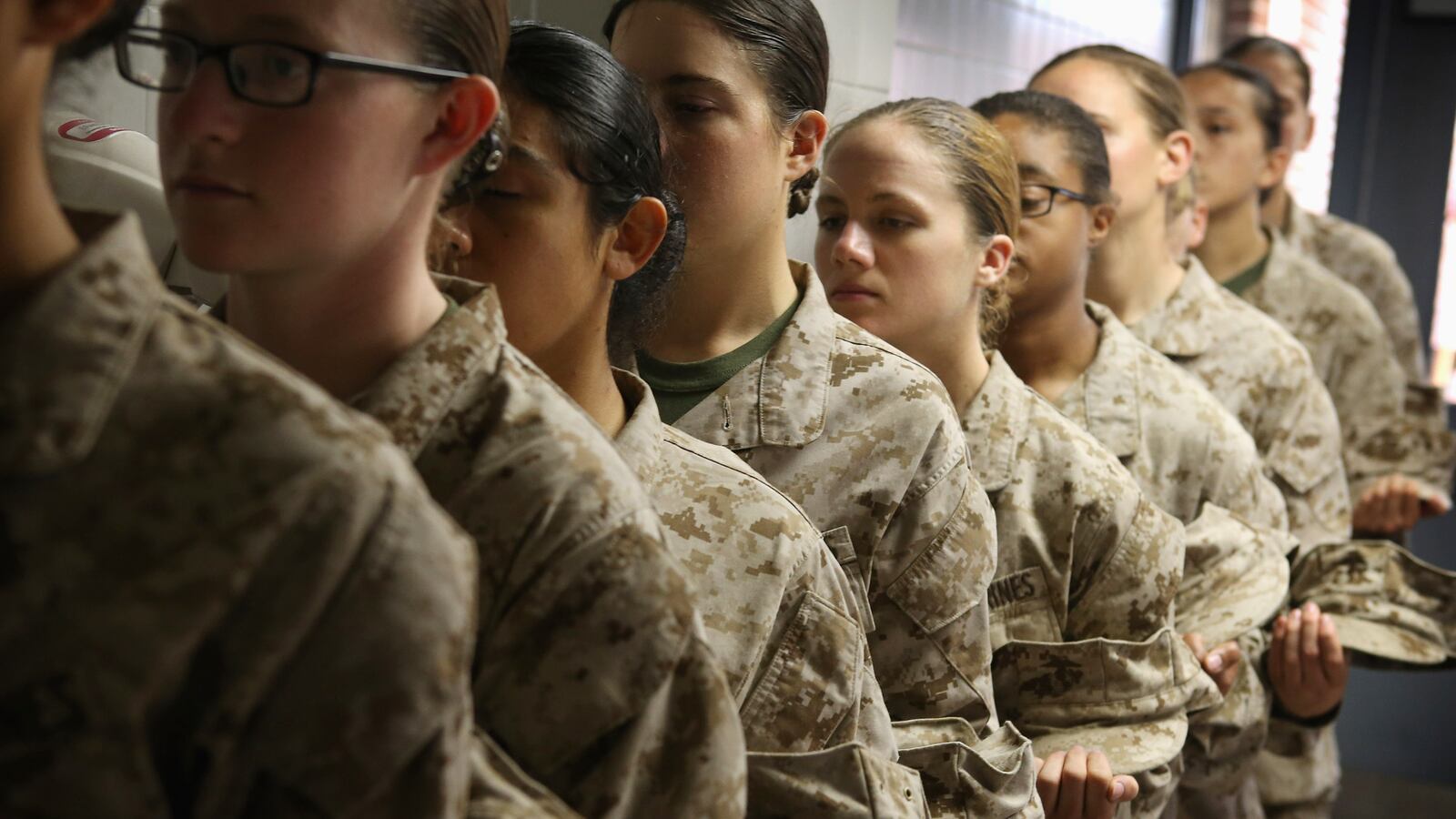Sexual assault in the military is nothing new, but it recently exploded into the public sphere with unsettling new survey results showing a sharp rise in reports by service members of sexual assault and unwanted sexual contact, a senior Air Force official in charge of its Sexual Assault Prevention and Response Office arrested and charged with sexual battery, and a general overturning the rape conviction of a subordinate. Those stories, coming after the Department of Defense announced earlier this year that it was ending its ban on women in combat positions, have led to a wave of reportage and opinion writing that too often has been misguided or misinformed, further confusing the issues.
Here are seven of the biggest myths and misconceptions about sexual assault and women in the military:
1. This Is Why Women Shouldn’t Be in Combat
It’s disturbing how many commentators dismiss women in the military as a “social experiment” and sexual assault as an inevitable outcome of it. If women must serve, this argument continues, they should be barred from combat deployments or remain in separate units.
I’ve yet to see anyone making this argument call for gender-segregated universities or other institutions, so presumably they believe these issues are unique to a military setting. Are they arguing that military men are more likely to be rapists than civilian men or that our troops are completely incapable of controlling their behavior? That seems an astonishing proposition, and one that I think the vast majority of law-abiding, responsible military men would find profoundly insulting.
Some, including Gen. Martin Dempsey, the chairman of the Joint Chiefs of Staff, have argued that the military policy banning women from combat jobs and units contributed to a climate that tacitly tolerated sexual harassment and assault of women—and that increasing women’s access to combat roles will drive down rates in the long run. I agree: studies show that when women gain greater equality, sexual assaults decline (although there may be a short-term “backlash effect” as men react to women’s shifting status).
2. DADT Repeal Is Why Sexual Assault Is on the Rise
Some of those arguing against women in combat also argue that the number of men who report being raped or assaulted stems from another “social experiment,” letting openly gay men and women serve.
But this relies on the false assumption that sexual assault is about sex. It’s not; it is a violent crime that is about aggression, domination, and power. And there’s no evidence that gay men commit the majority of male-on-male assaults. While the repeal of “don’t ask, don’t tell” was fully implemented in September 2011, there was no spike in the percentage of male victims in completed investigations in 2012.
3. The Number of Men Reporting an Assault Can't Be Right
Critics also argue that there's just no way that the (slight) majority of reports of “unwanted sexual contact” in this year’s survey came from men, and that the Pentagon's math or survey methodology must be wrong.
But the extrapolated survey number estimating that around 13,000 military men experienced unwanted sexual contact is consistent with VA's data that approximately 1 in 100 men who seek health care through the VA screen positive for military sexual trauma.
4. They’re Lying
Some have contended that the rising number of sexual-assault cases in fact reflects a steep rise in false reports.
But the military’s annual report doesn’t differentiate between false claims and simply unproven ones, and it is impossible to tell whether there’s been an increase in false reports or an increase in people coming forward to report harder-to-prove cases (including those from previous years in which there is no physical evidence, for example) that are therefore labeled unfounded.
5. This Is a Societal Problem, Not a Military One
Since the rate of reported sexual assaults by women in the military is similar to or lower than in the civilian world, it's not really that big of a deal, is it?
But this is a bogus comparison, since low reporting rates and the absence of apples-to-apples data make it effectively impossible to compare military and civilian sexual-assault reports. There is evidence that military rates are similar to those in somewhat comparable civilian communities like universities, which also skew younger than the population at large, though they tend not to be 85 percent male.
However, it is vital to consider what is known as the military rape differential: rates of other violent crimes are much lower in the military, in part because its recruiting process screens out many with criminal backgrounds. Think of it this way: troops commit only 20 percent as many murders or aggravated assaults as civilians, so if they commit sexual assaults at about the same rate as civilians, there’s a problem.
6. Military Women Are the Only Victims
Too much reporting treats sexual assault as a women’s problem, something that happens to military women by military men.
But the issue is much more complicated, involving men and women, civilians and service members on both sides of the equation. Coverage that focuses almost exclusively on women makes it even harder for men to come forward—and it may also be deterring some women from joining the military. Just last week I had lunch with a woman who wanted to join until this coverage broke, which has made her a little leery and led her mother to vigorously discourage her.
I think the military can be a great place for women. Rather than just staying out of the military, those who want an improved situation should be a part of working toward positive change.
7. Not in My Military
Some veterans think that it's simply inconceivable that this is happening in the military that they know and love.
The majority of troops are great. Honorable. Upstanding. But there are some total jackasses. Losers. Criminals. They slip through the screening process and then aren’t weeded out as fast as we would like. When I served, most of my fellow troops were fantastic—but I saw a few get kicked out for selling drugs or forging checks. I was sexually harassed; friends were sexually assaulted. Even if just 1 percent of those serving are criminals, that would mean over 10,000 criminals are on active duty.
We can admit that some awful people make it into the service without undermining our faith in the military as a whole. But it may not even be healthy to lionize troops so profoundly (the military is the most trusted institution in America)—even the Greatest Generation wasn't immune to the scourge of sexual assault.
Most people aren't saints; they're humans, with flaws and foibles. That's why we need an honest conversation, to help build strong leadership and institutions that set the tone on what is unacceptable, improve command climate, increase reporting, vigorously prosecute offenders, and work to drive down rates over time.






